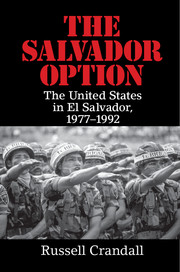Book contents
- Frontmatter
- Dedication
- Epigraph
- Contents
- List of Figures
- List of Organizations
- Acknowledgments
- 1 Introduction
- PART ONE EL SALVADOR IN THE COLD WAR
- 2 Farabundo Martí, La Matanza, and a Stolen Election
- 3 The United States in Latin America
- 4 American Military Mission in El Salvador
- 5 A Divided Nation: Military Traditions, Democratic Third Way, and Liberation Theology
- 6 Guerrillas Are Born
- PART TWO JIMMY CARTER
- PART THREE RONALD REAGAN
- PART FOUR GEORGE H. W. BUSH
- PART FIVE POSTWAR
- Notes
- Bibliography
- Index
2 - Farabundo Martí, La Matanza, and a Stolen Election
from PART ONE - EL SALVADOR IN THE COLD WAR
Published online by Cambridge University Press: 05 June 2016
- Frontmatter
- Dedication
- Epigraph
- Contents
- List of Figures
- List of Organizations
- Acknowledgments
- 1 Introduction
- PART ONE EL SALVADOR IN THE COLD WAR
- 2 Farabundo Martí, La Matanza, and a Stolen Election
- 3 The United States in Latin America
- 4 American Military Mission in El Salvador
- 5 A Divided Nation: Military Traditions, Democratic Third Way, and Liberation Theology
- 6 Guerrillas Are Born
- PART TWO JIMMY CARTER
- PART THREE RONALD REAGAN
- PART FOUR GEORGE H. W. BUSH
- PART FIVE POSTWAR
- Notes
- Bibliography
- Index
Summary
Cuando la historia no se puede escribir con la pluma, hay que escribirla con el fusil. (When history cannot be written with a pen, it must be done with a gun.)
– Agustín Farabundo Martí, Salvadoran communist, 1930sCoffee growers should not anguish over the situation in El Salvador today; there was a similar one in 1932, and it was solved then [and] it can be now.
– Representative of the Frente Unido Cafetalero (United Coffee Union, plantation owners), March 1980El Salvador – the smallest and most densely populated country in Central America – presents a classic setting for social and political unrest.
– U.S. Department of State Bulletin, January 1980El Salvador's history has revolved around its scarcest commodity: land. From the time the Spanish conquistadors arrived in the early 16th century and through the turbulent decades of the late 20th century, rural land and agriculture lay at the core of the country's tumultuous and deeply inequitable social and economic history. El Salvador's searing legacy of unequal distribution can be linked back to the Spanish colonial system whereby land ownership was vested in the crown. The land now known as modern El Salvador was ruled before the Spanish Conquest by an assortment of indigenous civilizations, including the Aztec and Maya; the local Pipil nation was active in the area at the time of Spanish exploration in 1524. Lacking precious metals and mineral resources, El Salvador was a backwater in Spain's colonial empire. Under the formal administration of the captaincy-general of Guatemala during this time, local landowners held de facto sway. Along with the rest of Central America, in 1821 El Salvador declared its independence from Spain. It was initially incorporated into newly independent Mexico and then joined the United Provinces of Central America – a failed attempt to create a federal republic modeled on the United States. In 1841, El Salvador declared itself an independent country.
The smallest country in Central America, El Salvador's early independence was marked by considerable political tumult. Filled with large plantations owned by a tiny elite, El Salvador's first key cash crop was indigo. Between the 1870s and 1930s, however, another export crop replaced the ebbing indigo: coffee.
- Type
- Chapter
- Information
- The Salvador OptionThe United States in El Salvador, 1977–1992, pp. 15 - 24Publisher: Cambridge University PressPrint publication year: 2016

